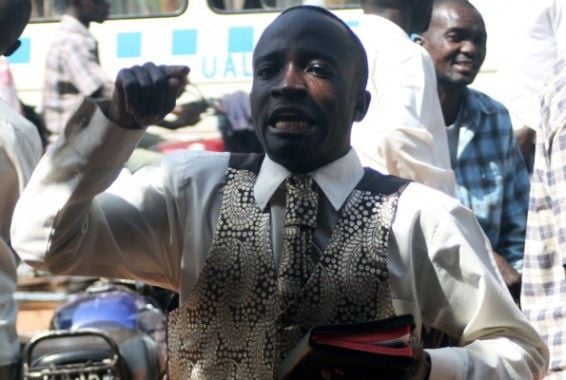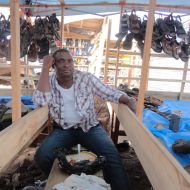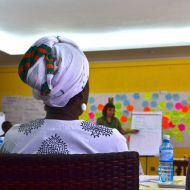Fire and Brimstone Burn a Path to Prosperity for Freelance Preachers

Street preachers have a unique shot at upward mobility in Accra. Photo credit: Sankofa
George Ayirebi stands at Kwame Nkrumah Circle every day from 5:30 to 11 a.m., preaching. “For salvation,” he tells me. “To do the right thing.”
Today, he’s wearing a neatly buttoned yellow long-sleeved dress shirt, tucked into slightly faded slacks and good shoes with slightly fraying seams. In front of him are three cardboard boxes, stacked neatly, the top one’s open side facing up. Balanced on a corner is a bible, open to Matthew. Occasionally, one of the passersby at the busy intersection pauses to drop a cedi or a couple of coins into his box.
Four years ago, on June 28, 2009 to be exact, George, now 47, heard the call of God. At the time he was a mechanic, doing small jobs, “repairing watches, things like that.” As he tells it, God told him to stop doing that work and devote himself to preaching salvation. So he began. He never had any formal training, but eventually he was able to establish a church, the Church of Revelation, in central Accra, where a small congregation of 25 or so, according to him, regularly worships each Sunday. As we stand talking, one of his congregants, who introduces himself as Godson, drops 2 cedis in the box. “I met him here, preaching,” says Godson of George.
Half a block down from George is another preacher, whose blaring performance I’d heard loud and clear from across the street. He has two big speakers and a soundboard set up; unlike George, he’s not observing the month-long ban on loud noise that the indigenous Ga authorities request during the time leading up to their annual Homowo festival. He’s dressed in a bright red polo shirt, his style seeming flashy and charismatic compared to George’s toned-down though forceful presence. Though he’s preaching in Akan, I do understand a few words: “Collection,” “Jesus,” and, over and over, “one cedi.” Also close by, and a bit more rare, a woman stands on the pedestrian bridge, with a box-and-bible setup similar to George’s, though she also has a megaphone.
God, and Christianity in particular, are ubiquitous in Accra. The Word Miracle Church Int., “where Jesus makes everybody somebody,” is a small canopy-style structure nestled in among kiosks selling your basic consumer goods near the 37 bus stop. It’s one of the hundred such ministries you might pass along a journey through Accra. I started my morning early, at Christian Center, a large and echoey unfinished two-story church with a banner hanging outside advertising for meetings of the “Women of Destiny Prayer Packed Explosion.” At Banku Junction, The Upper Room Revival Ministries appropriately occupies a top floor space in a strip mall. The brand new Action Chapel is a sprawling megachurch on Spintex Road. A large billboard with the handsome face of Sonnie Badu, gospel megastar, advertises a four-day Worshipper’s Conference that took place in April. A faded sign on an old pink building in Kokomlemle says Abundant Life Int. Ministries. Broken up by a block apparently devoted to the sale of Benz parts, Calvary Christian Tabernacle occupies a new brick-and-glass building while Christ Apostolic Church is in a more modest (though neon green) building across the street.
Preachers, even more so than musicians or actors, are the smiling faces found on billboards here, the rockstars of the city. And with all this prestige comes money, or perhaps vice versa. Looked at from a purely economic point of view, getting into the business of preaching provides an avenue of advancement – both social and economic – in a country where such paths are rare. After all, as a mechanic and repairman, in a city full of mechanics and repairmen, a major advance in social status seems unlikely. At best, maybe you’ll get a lot of business, employ a few people, own a large shop. But if you’re good at preaching, you can gain adherents, and those adherents can bring you cash all day long.
There are a few accepted paths into the industry-slash-ministry. You can go out preaching, on buses or in marketplaces, and earn money and souls. One of my first experiences in Ghana was with the dozens of preachers and their small groups of followers on the lawn of Mensah Sarbah Hall at the University of Ghana, where they would stay up late, chanting, preaching, speaking in tongues. Soon after, I hopped on my first trotros and found freelance preachers there, too. The speaker and soundboard set-up is fairly typical for a major transit station, as I discovered when, bleary-eyed and waiting for a shared taxi to fill up early one morning, I was confronted with the fire-and-brimstone-style preaching of America House station’s resident spiritual man.
Preachers are common sight on Ghana’s buses, spreading the gospel to a captive audience. Video by slypok1 via YouTube
Some people are trained as evangelists by conventional churches and become freelance, soliciting money and building their own ministries. Successful preachers build congregations. You may even be able to open a small church – perhaps just a bush church or tiny kiosk at first, then a real building, even a very large and fancy building. And if you’re really good, you can open church branches, have prayer seminars, travel.
There are any number of role models: The jet-setting men on the billboards like Bishop Duncan Williams of Action Chapel, or the Prophet T.B. Joshua, whose visit to Ghana a few weeks ago was a source of constant conversation. One interesting, well-known example is Dr. Kwadwo Sarfo, the leader of Christo Asarfo. He started out as a relatively poor freelance preacher. Now he has churches all over the country, a television show and centers of manufacturing to provide employment for his followers and assemble products in Ghana.
God and money mixed up, of course, can get a little complicated, especially in a place where God is such big business. The image of the charlatan preacher is not a distant concept. (Nigerian writer Wole Soyinka’s plays The Trials of Brother Jero are about a charlatan preacher in that country whose only motive is money). When I asked Godson, George’s congregant, why he follows George, why he comes every week all the way from Kasoa, on the outskirts of Accra, for his church services, he told me George isn’t concerned about “money matters. He preaches for the Bible. Some people preach for the stomach.”
Still, thanking God for good fortune and petitioning him for more has a monetary component in many Ghanaians’ minds. As Sammy, a member of the Ghana Federation for the Urban Poor, puts it, “Most of us in the informal sector do not have much education or many prospects. Anything we do that is progressing, we believe that it’s God…and we believe that we ought to appreciate that.” He paraphrases a biblical teaching: “If you give a preacher a cup of water, you will definitely see the reward.”
This attitude is connected to the “prosperity gospel” brought to Ghana from the United States via televangelists in the ’90s and early 2000s. Prosperity gospel is particularly popular in West Africa, and has been a major influence in Ghana’s neo-Pentecostal churches. These movements are also very closely connected with faith healing, which has a long heritage among Ghana’s traditional religions as well as a connection with the United States’ similar faith healing. George tells me very specifically that unlike T.B. Joshua, he does not use oils or holy water for healing. The word of God, however, does work through him, he tells me, to heal the sick. “If you are sick, call me and I’ll pray for you.”
I ask George if Accra Municipal Assembly officials ever bother him, like they do vendors who sell on sidewalks. No, no, he says, “because I’m doing God’s work.” Does he get enough in collections to support himself and his wife and two children now that he no longer works as a mechanic? Since God called him to this work, God will provide: “Make I give him bread,” is what George imagines God saying of him.
George may or may not be headed for wealth, influence and prestige, but he is certainly part of the huge religion industrial complex meeting Ghana’s demand for ministry. His small informal congregation has now connected with the 7th Day Adventists, and he will soon start holding services on Saturdays instead of Sundays. He already travels and preaches a little, visiting the Western Region and the Central Region. He dreams of getting a car — “If I have got car, I’ll preach across the nation” — and opening more branches of his church. “I be pastor,” he says. “I be apostle. I be evangelist. Any place I’m standing, I’m preaching.”









